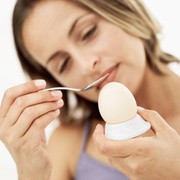 Stockbyte/Thinkstock
Stockbyte/Thinkstock
Scientists are tirelessly working to find answers to decrease memory loss and wipe out Alzheimer’s and dementia-related illness. And they are now discovering that certain nutrients can help combat mental decline as we age.
The good news is you may be already consuming the foods that are essential for brain health.
Choline is a nutrient in foods such as chicken, eggs, fish and milk as well as certain legumes such as soy and kidney beans.
“Choline is found in very limited amounts in foods. Egg yolks are an excellent source, but because it’s been drummed into our heads that we should eat only the whites of eggs, we’ve been dumping our only major supplier of choline down the drain,” says Susan Kleiner, PhD, RD, owner of High Performance Nutrition in Mercer Island, Washington.
“Choline is responsible for every thought and every movement you make,” Kleiner says. “Without choline, you cannot have a healthy brain.”
How much choline do we need? An amount of 425 milligrams a day is recommended.
One whole egg is only 113 milligrams. You should find a multi-vitamin to make up the difference. Mid-lifers and postmenopausal women are especially encouraged to boost their choline levels.
A new research study has shown that vitamin D3 which comes from sunshine and curcumin, a substance found in turmeric, may be valuable nutrients clearing plaques that build up and cause Alzheimer's disease.
"This new study helped clarify the key mechanisms involved, which will help us better understand the usefulness of vitamin D3 and curcumin as possible therapies for Alzheimer's disease," said study researcher Dr. Milan Fiala, of the David Geffen School of Medicine at UCLA and the Veterans Affairs Greater Los Angeles Healthcare System.
How much D3 and curcumin do we need? We may need 5,000 to 7,000 IUs of vitamin D3 per day, or regular sun exposure.
Add curcumin to your diet, with curry-enriched food. Supplementing 300 to 500 mg per day is said to help clear brain tangles and prevent Alzheimer's disease.
Certain types of fish such has tuna, salmon, mackerel, herring, sardines and anchovies contain high levels of DHA, an omega-3 fatty acid that is thought to interconnect nerve cells. Researchers have found that those subjects with lower levels of omega-3 fatty acids did poorly on memory test.
Dr. Zaldy Tan, an Alzheimer’s researcher from the University of California at Los Angeles who led the U.S. research reported in the journal Neurology, said: "People with lower blood levels of omega-3 fatty acids had lower brain volumes that were equivalent to about two years of structural brain ageing."
How much fish do we need? For the best results, eat some kind of oily fish twice a week, or take a fish oil supplement of up to 2000 milligrams.
Sources:
Huffington Post – Healthy Living - Vitamin D And Alzheimer's: Study Shows How The Nutrient Can Help The Brain Ward Off Amyloid Plaques. Web. 29, March, 2012
http://www.huffingtonpost.com/2012/03/08/vitamin-d-alzheimers-amyloid-beta-plaque-protein_n_1326952.html
Natural News - Vitamin D3 and curcumin synergistically clear brain tangles to help prevent Alzheimer's dementia. Web. 29, March, 2012 http://www.naturalnews.com/035328_vitamin_D3_curcumin_Alzheimers.html#ixzz1qXTnsSSA
Huff Post – UK – Healthy Living - Vitamin D And Alzheimer's: Study Shows How The Nutrient Can Help The Brain Ward Off Amyloid Plaques. Web. 29, March, 2012
http://www.huffingtonpost.co.uk/2011/11/25/chicken-eggs-and-milk-sharpen-memory_n_1113136.html#s476872&title=Oily_Fish_
Daily Mail Online – Health - New proof daily dose of fish oil does help keep your brain young. Web. 29, March, 2012
http://www.dailymail.co.uk/health/article-2107235/New-proof-daily-dose-fish-oil-does-help-brain-yougn.html#ixzz1qXIj0gRH
Reviewed March 30, 2012
by Michele Blacksberg RN
Edited by Jody Smith






Add a CommentComments
There are no comments yet. Be the first one and get the conversation started!